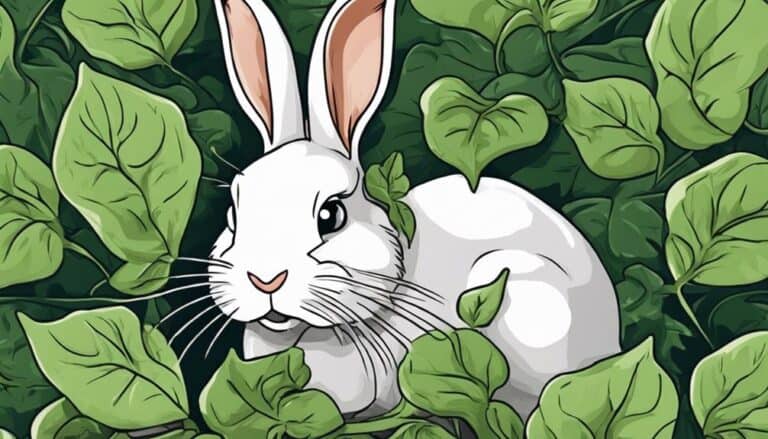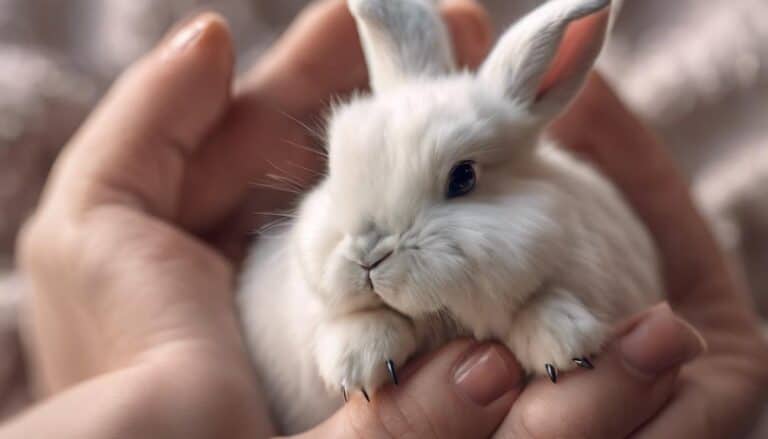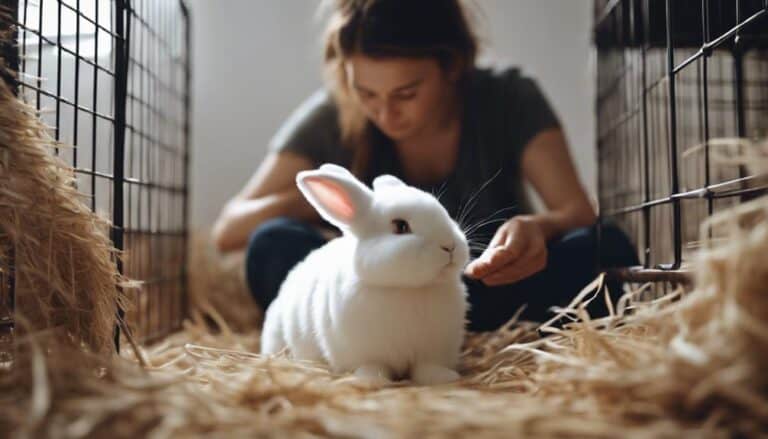If you notice your rabbit suddenly becoming withdrawn, avoiding interactions, and exhibiting tense body language like flattened ears and a tucked tail, you might suspect they are being bullied. But these signs alone aren't enough to confirm bullying.
There are other signs you should look out for. For instance, changes in appetite, sleeping patterns, or hiding more than usual could indicate your rabbit is being bullied.
Even if you're not sure, it's always better to err on the side of caution.
Paying close attention to subtle changes in behavior and seeking further guidance can help protect the well-being of your furry friend.
Consult with a veterinarian or a rabbit expert if you're concerned about bullying in your rabbit's environment.
Contents
Key Takeaways
So, you want to know how to spot if your rabbit is being bullied? Well, here are some signs to look out for:
If you notice clumps of fur around the cage, it could be a sign that your rabbit is being bullied. This is because rabbits often pull out their own fur when they're stressed or anxious.
Your rabbit might also start withdrawing and hiding from interactions. This means they might avoid coming out of their hiding places or interacting with you or other rabbits.
You should also keep an eye out for tense body language and flattened ears. Rabbits that are being bullied often display these physical signs of stress.
Additionally, if your rabbit shows decreased interest in activities or meals, it could be a sign that they're being bullied. Rabbits love to eat and play, so if they're not interested in these things, something might be wrong.
Finally, if your rabbit starts thumping their hind legs in response to stress, it's a clear sign that they're feeling anxious or scared. This is a common behavior in rabbits that are being bullied.
Behavioral Changes
If you notice any behavioral changes in your rabbit, like clumps of hair around the cage or growling and biting off hair, these might be signs of bullying. Think about it – a rabbit that's being bullied might start to withdraw from things it used to love. It may become less interactive and avoid social interactions with you or other rabbits.
This withdrawal can stem from the stress and fear caused by bullying, leading to a decrease in overall happiness and well-being for your furry friend. So, it's super important to observe your rabbit's behavior closely to identify any signs of withdrawal.
For instance, a bullied rabbit might spend more time hiding or staying in secluded areas of the cage to avoid the aggressor.
This avoidance of normal activities and interactions can really impact your rabbit's mental and physical health. If left unaddressed, this withdrawal can escalate into long-term behavioral issues, affecting your rabbit's quality of life.
But, if you recognize these behavioral changes early on, you can take steps to address the bullying and create a safe and harmonious environment for your rabbit.
Reduced Happy Behaviors
If you notice your rabbit isn’t as playful as it used to be, or doesn’t seem as excited about meal times, it could be a sign that it’s not as happy as it should be. Maybe it used to hop around and toss toys, but now it just doesn’t seem interested in playing anymore. Observing changes in your rabbit’s behavior is crucial for understanding its well-being. If you’re wondering how to identify a happy rabbit, look for signs such as binkies, relaxed body posture, and a willingness to interact with you and its environment. A content rabbit will also groom itself regularly and show curiosity about new things, so keeping an eye on these behaviors can help ensure your furry friend is thriving.
This could be because it's feeling stressed or threatened by other rabbits or even guinea pigs. Rabbits are social animals that need companionship, but they can also feel overwhelmed or scared if they're being bullied.
So, if you notice your rabbit is withdrawn or disinterested in activities it used to love, it's worth looking into. Also, pay attention to how your rabbit acts during meal times. If it used to get really excited about food, but now seems hesitant or uninterested, that could be another sign that something's going on.
Avoidance and Hiding
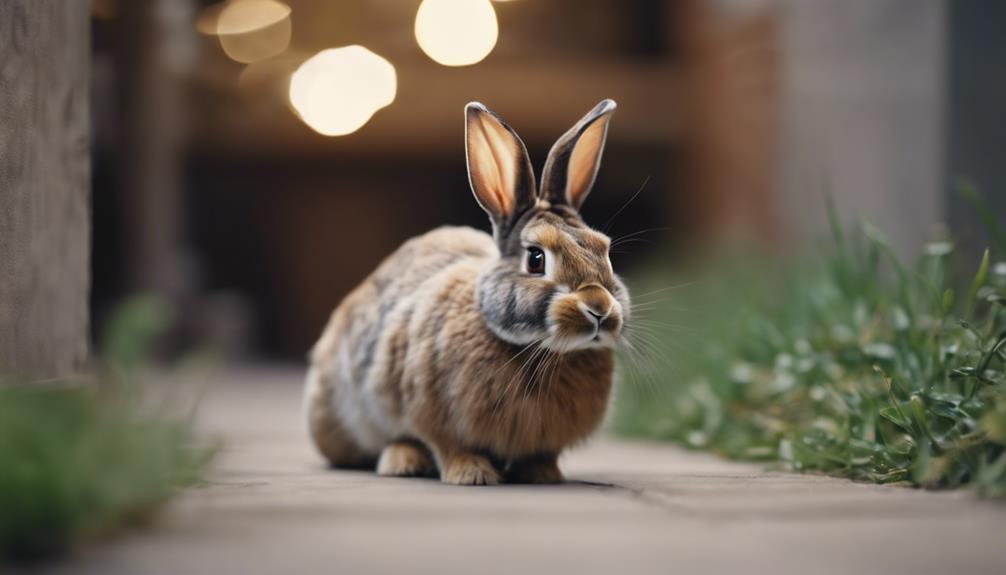
If your rabbit is seeking seclusion in unusual places or actively avoiding interactions with you or other pets, it could be a sign that it's experiencing bullying. This kind of behavior is often accompanied by hiding in corners, under furniture, or behind objects for extended periods. By withdrawing from usual social interactions, your rabbit may be signaling that it's in distress due to bullying.
When you notice your rabbit displaying avoidance and hiding behaviors, pay attention to its body language. Does it hunch its body, tuck its ears back, or have a tense posture while trying to conceal itself? These physical cues can give you insights into your rabbit's emotional state and the impact of bullying on its well-being.
If you notice your rabbit consistently retreating or avoiding contact, you need to get to the bottom of it. It's essential to create a safe and secure environment for your rabbit and address any bullying dynamics that might be at play. By doing so, you can help alleviate your rabbit's stress and encourage more positive interactions.
Tense Body Posture
When your rabbit is being bullied, one common sign of distress is a tense body posture. This physical response is a clear indication that your rabbit feels threatened or uncomfortable in its environment.
Your rabbit may appear stiff and rigid, with its body tensed up and muscles visibly tight. This is often referred to as a stiffened body.
Another possible sign is a hunched posture, where the rabbit lowers its body closer to the ground, almost as if trying to make itself smaller to avoid confrontation.
You might also notice that your rabbit's tail is tightly pressed against its body or tucked between its hind legs, showing a defensive stance. This is often referred to as a tightly tucked tail.
If you notice your rabbit exhibiting these signs, it's essential to keep an eye on its interactions with other rabbits or pets in the environment.
Creating a safe and stress-free space for your rabbit is crucial to ensure their well-being and happiness.
Flattened Ears
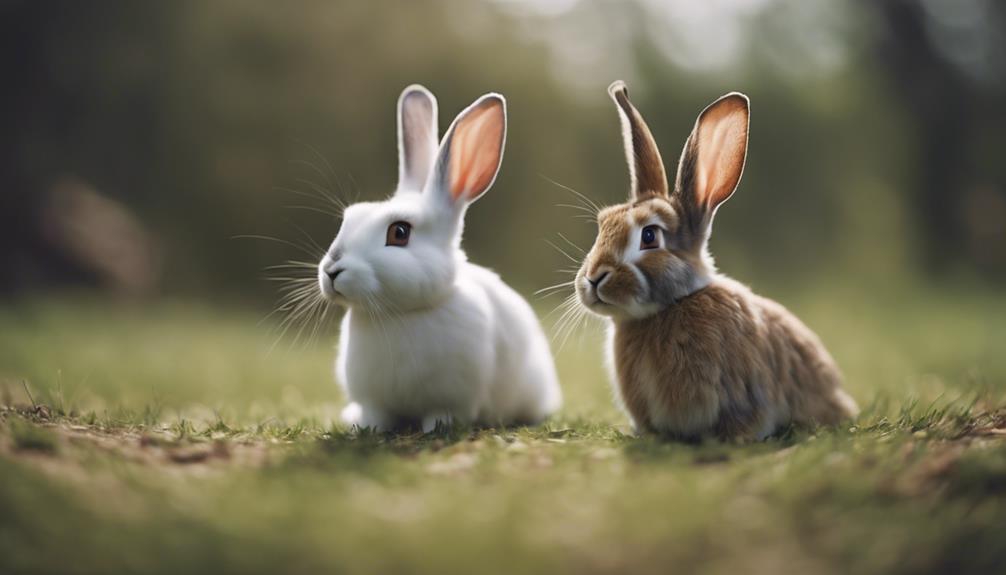
One common sign that a rabbit is being bullied is when they flatten their ears. This usually means they're feeling scared, anxious, or stressed because of a dominant rabbit or something else in their environment that's making them feel threatened or intimidated.
When this happens, it can really affect their confidence and overall well-being.
If you notice your rabbit is flattening their ears a lot, especially around a certain rabbit or in certain areas where they might feel unsafe, it could be a sign that bullying is going on.
Look out for other signs like hiding, avoiding things, changes in appetite, or trouble sleeping too. Paying attention to your rabbit's ear position and behavior is really important for catching any bullying problems early on.
Make sure your rabbit has a safe and supportive space to live in, and if you think they're being bullied, take action to stop it and protect them.
Lack of Nose Twitching
If your rabbit's nose isn't twitching, it could be a sign that they're feeling stressed or uncomfortable due to interactions with other rabbits or pets.
When a rabbit's nose remains still, it might suggest they're feeling anxious or threatened.
If their body appears tense or stiff, and their nose isn't twitching, it could indicate they're on edge or feeling threatened.
Also, if your rabbit is avoiding social interactions with you or other animals, and their nose isn't twitching, it may signify they're trying to stay away from stressful situations.
You might also notice your rabbit hiding more in their enclosure or avoiding areas where they used to roam freely. If they're doing this and their nose isn't twitching, it could indicate they're seeking safety and solitude.
Attempts to Move Away
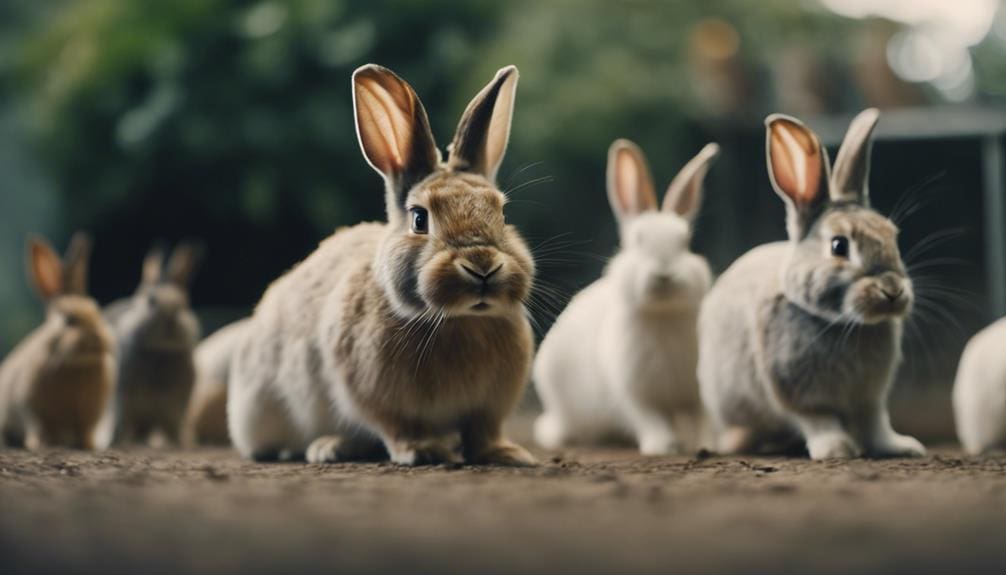
If your rabbit is feeling bullied, they might try to get away from whatever's stressing them out. Rabbits are social animals, but when they feel threatened, they'll try to distance themselves from the problem.
You might notice your rabbit avoiding certain parts of their enclosure or moving away when another rabbit or even you approach them. This behavior can look like they don't want to interact with others or prefer to be alone.
When you're watching your rabbit, pay attention to how they react in different situations.
If you notice they consistently try to get away from certain rabbits or areas, it could be a sign they're feeling overwhelmed or intimidated.
Creating a safe and comfortable environment for your rabbit and keeping an eye on their interactions can help deal with any bullying issues and make sure your pet is doing okay.
Rabbits, just like humans, have their own ways of showing they're stressed, and trying to move away is one way they might be telling you something's wrong.
Hiding Behavior
Observing your rabbit's behavior can help you identify signs of bullying. One common response to stress or intimidation is hiding behavior. This is a natural way for rabbits to cope with feeling overwhelmed or threatened in their environment.
When your rabbit feels bullied, they may display hiding behavior in a few different ways. For example, they might seek shelter in hidden spots in their enclosure, such as tunnels, boxes, or behind furniture, to avoid interactions with other rabbits or pets.
If your rabbit is being bullied, they may also avoid interaction altogether. This means they mightn't come out of their hiding spot even during feeding times or playtime.
Another sign of hiding behavior is freezing or reduced movement. When feeling intimidated, rabbits may freeze in place or move less frequently, spending long periods in one particular hidden location.
Thumping Hind Legs
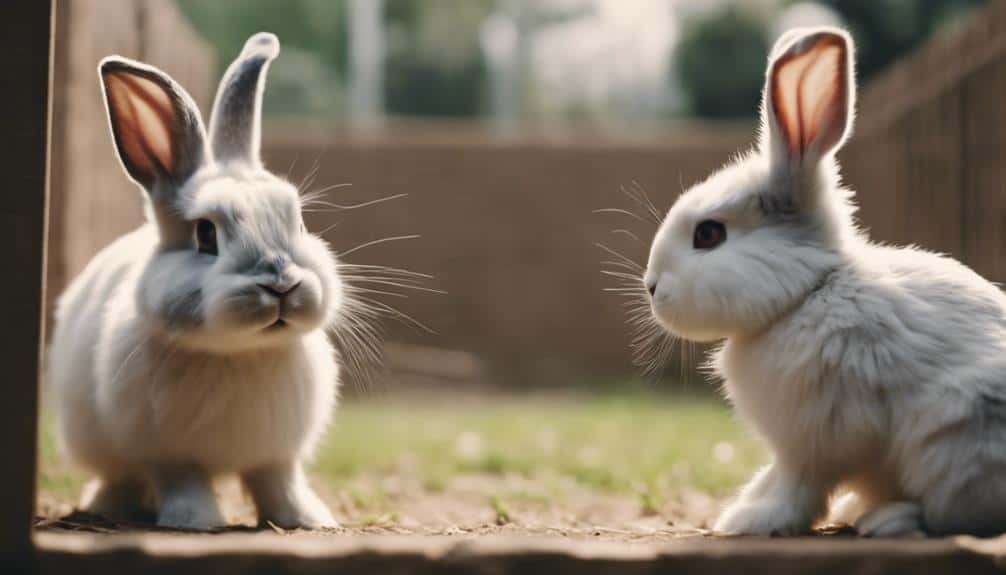
So, this behavior is often a response to bullying or stress in their environment.
When a rabbit feels threatened or uncomfortable, they'll forcefully hit the ground with their hind legs, creating a loud thumping sound.
This is usually a sign that they're feeling distressed or agitated.
Think of thumping hind legs as a cry for help.
Your rabbit might be feeling scared, anxious, or overwhelmed, and they're trying to tell you that something's wrong.
If you notice this behavior happening frequently, it's time to take a closer look at their environment.
Are they being bullied by another rabbit or even a different pet?
Is there something in their surroundings that's making them feel threatened?
Seeking Veterinary Advice
If you're concerned about bullying behaviors in your rabbits, it's crucial to seek guidance from a veterinarian who's knowledgeable about rabbits.
If you notice any of the following signs, don't hesitate to reach out for advice:
Changes in eating or digestive patterns can be a red flag. If your rabbit hasn't eaten or pooped in 12-24 hours, it could indicate underlying health issues that need immediate attention.
Keep an eye out for physical signs of bullying too. For instance, if you find clumps of fur around the cage, it could be a sign of aggressive behavior between rabbits.
Behavioral changes are also a cause for concern. If you notice your rabbit is acting strangely – like increased aggression or fearfulness – it's vital to consult with a veterinarian experienced in rabbit care.
A rabbit-savvy veterinarian can help you figure out whether separating the rabbits is necessary and offer advice on potential solutions like spaying or neutering to reduce aggressive behaviors.
Regular veterinary check-ups can also help detect and prevent severe consequences related to bullying in rabbits.
Conclusion
When your rabbit is being bullied, it can be really tough to see. They might start acting differently, and it's up to you to pick up on these changes.
If you notice any of these signs, it's time to take action. Your rabbit might become more aggressive or fearful.
They could stop eating or start losing weight. You might see changes in their behavior, like hiding more or avoiding certain areas.
Some rabbits might even start pulling their own fur out or injuring themselves.
If you suspect your rabbit is being bullied, get in touch with a vet for guidance. They can help you figure out what's going on and how to make things better.
By creating a safe and comfortable environment, you can help your rabbit feel more at ease and thrive once again.

